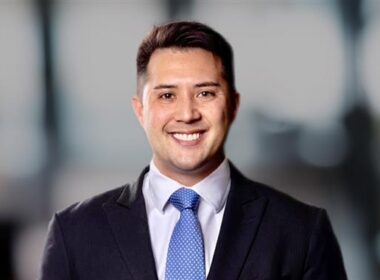Fundamental to making a strong case in front of a judge or jury is the ability to tell a story and to argue its points persuasively. Voice, projection, pacing and clarity are vital - and so is body language, gesture and expression.
According to Jaques in Shakespeare’s As You Like It, “All the world’s a stage, and all the men and women merely players …” Likewise, the courtroom is also a stage in which every attendee has a role and there are consequences, often hugely important, riding upon those in roles of advocacy and judgement.
Perhaps unsurprisingly, there are a number of acting schools and private teachers offering courses and tuition to lawyers on how to operate in a courtroom environment both in Australia and internationally.
Many leading actors studied law, including British actor Gemma Chan and Australia’s Rebel Wilson (naming US TV host Jerry Springer doesn’t entirely make the point, but he certainly navigated some heated arguments on screen). On the flipside, actors who play fictional lawyers are compelling in their confidence, delivery, and charisma as proven by Marta Dusseldorp as the senior prosecutor Janet King on ABC.
As every lawyer knows, presenting their client’s story in a way that serves their client’s best interests while remaining truthful and just is imperative to the outcome of their case. To that extent, the lawyer is a director, writer and actor rolled into one – non-fictional, of course. But, unlike theatre, there is an opposing party in the courtroom, including experts and witnesses, and no script can account for every possibility that will arise in the courtroom. The skills of improv, like vocal delivery, breathwork, and body language, can easily transition from acting school to the legal industry.
Jamie Coleman is an Associate Lawyer at Bartier Perry in Sydney. She felt that four years at a performing arts school gave her advantages over her peers without that specific training.
“My experience at Wollongong High School of the Performing Arts, and as a dancer for most of my life, helped to prepare me as a junior lawyer attending court. I know that it’s not an uncommon experience to find court attendances daunting, particularly for junior lawyers, but I was able to draw on my experiences as a performer to steady my nerves and present my submissions. It was comforting to think of the bar table as just my new stage,” she tells LSJ.
Coleman loved performing at end of year showcases, in competitions, or for her HSC practical examinations.
“I was lucky enough to study dance, drama and singing at various stages of my life, and so I’ve had lots of opportunities to perform. I now regularly draw on my performance skills in my career as a lawyer, particularly to overcome any nerves before going to court or meeting a new client. I’d say I use breathing techniques for grounding myself every day at work,” she says.
Coleman is an advocate of acting courses for lawyers.
“Aside from the obvious benefits that I have noticed in my career, like getting over a feeling of stage fright or being able to breathe to ground myself, I think it’s really important that as lawyers we have hobbies and passions outside of the law, and that we bring our whole selves to work. It makes for a much more diverse profession, and I think it makes lawyers seem more accessible to our clients.”
There is plenty of role-playing during legal education, but that tends to be the end of using acting techniques once a student graduates to a law career. Not always, however. The National Institute of Dramatic Art runs a corporate training arm that has worked with private law firms and government legal professionals.
Tessa Winton has been a full-time Learning Design Specialist at the National Institute of Dramatic Art (NIDA) in Sydney for the last two years following 20 years as a freelance acting tutor. She graduated from NIDA – which boasts graduates including Cate Blanchett, Sarah Snook, Mel Gibson and Baz Luhrmann – in 1996, and says a number of students from her year went on to pursue careers in law.
“What we learn at drama school has so many parallels with what lawyers do,” she tells LSJ. “The art of persuasion is common to both acting and law.”
She says Aristotle’s Rhetoric is the theory underpinning her methodology to acting and the art of persuasion.
“Legend has it that Aristotle used to go down to the forum to observe political speeches and he noticed that some people were always successful in having their proposals made into policy, while others might have delivered rhetoric that sounded nice but never convinced anyone to act,” she says.
The three pillars of Aristotle’s Rhetoric, or the “Persuasion Triad”, are that trust plus emotion plus logic equals influence.
“In order for lawyers to be the most persuasive that they can be, whether that’s in a conversation or a more public forum, we help them build those esoteric skills of building trust with someone else and infusing a conversation or presentation with emotion in order to capture someone’s attention. Obviously, the logic is still down to them. They have to do the hard work and come up with the watertight argument, but those other two elements are what actors learn at drama school, and those are the parallels that we’re able to bring into the teaching that we do with lawyers,” Winton says.
“It’s incredibly satisfying to empower someone else to begin to have some mindfulness around their communication, and to start to make choices about the way that they communicate, and not just limit themselves to habits.”
She explains the renowned Stanislavski method is used to find the truth in characters and situations as a means of building trust between actor and audience.
“When it comes to trust, we help people to build an awareness of their gestures and body language. That can start with identifying negative factors, such as fidgeting or moving around that create a barrier between people. We also work on eye contact and ways of managing nerves. As a lawyer you want to go in and have an aura of confidence and command of a space,” she says.
Winton explains that while lawyers rely heavily upon intellect, that can be at the expense of emotion and trust in their communication.
“Those are skillsets as much as writing a great speech or proposal. The commonalities between acting and the law are much greater than any challenges that exist for lawyers to embrace acting techniques. Lawyers often say they wanted to be an actor. There’s an intellectual shared passion for storytelling, justice, empathy and the ability to put yourself in someone else’s shoes,” she says.
“You can’t judge a character, or you can’t play them. Can you imagine trying to portray Macbeth if you’re judging him as a person? Likewise, if you’re arguing a case as a lawyer, you’re asking: how did my client get to this place as a person? Where can I find the point of compassion to argue their case? That’s a lifelong pursuit, for me and for many people. Lawyers are often our easiest clients to teach because they have already honed that empathy and ability to stand up in front of others and to talk with passion.”
Winton admits that improvisation is not her strongest skill, though she is still working on it 30 years’ after graduating. It is a skill that can prove fundamental to lawyers.
“As a lawyer, improvisation is your ability to let go of control. We hold tightly to control, but that makes it difficult to handle it when a conversation moves in a different direction, or a piece of evidence or information arises that we didn’t know about, and to take that in stride and carry on. Every interaction is an improvisation. During a course, we do activities and play games, then debrief it to build those skills and to instil comfort with improvisation rather than frustration or discomfort with letting go of control.”
If this sounds almost like a personal journey as much as a professional one, Winton entirely agrees.
“A lot of acting training is also about self-development and becoming aware of our habits and choices. Some people come into courses being aware of their habits, and some are not. So that comes back to a sense of safety, which we really establish at the beginning of a course. The work that we do is powerful and it’s our responsibility to look after people. When I’m working with lawyers, I often quote Steven Covey’s ‘The 7 Habits of Highly Effective People’, in which he says ‘we judge ourselves by our intention, but we judge others by their impact’.”
“If we can make that gap as small as possible, so that we align our intention and how we actually come across, then we’re going to do well in achieving our objective and being persuasive.”
Winton says that ideally corporate clients, including lawyers or firms, can dedicate two days to a course. In reality, she says that one day is sufficient to cover foundational skills and provide tools for people to work on in their own time, while some courses run for a couple of hours once a week for a month.
An acting course is not just for freshly graduated law students, she emphasises, and “it’s never too late” to start.
“It’s easier to come into a course early in a law career because there’s less bad habits to undo, and it’s work you can keep coming back to over the span of a career. But, if you’re getting into habits that aren’t working for you, this course can give you tools at any point in your career. I find it really impressive when people late in their career want to challenge themselves to be the best in their career, recognising they’re never finished products.”
The key acting skills that benefit lawyers, according to private acting coach Pip Edwards
Use of instrument: Engaging body language, voice, eye contact, and energy.
Gravitas: Enhancing or diminishing the impression of authority.
Empathy and emotional intelligence: Using emotion effectively.
Connection: Understanding and engaging with all perspectives.
Managing nerves: Staying present and trusting in oneself.
Breath and energy: Pitching performance energy to fit the room size.
Storytelling: Clear, structured communication.
Authenticity: Balancing authenticity and congruence in communication.
Camera skills: Techniques for virtual meetings.
Role-playing: Practising negotiations with challenging personalities.
Listening: Developing deep listening skills.
Improvisation: Thinking and speaking on your feet.
De-rolling: Techniques to avoid bringing emotional weight home.




